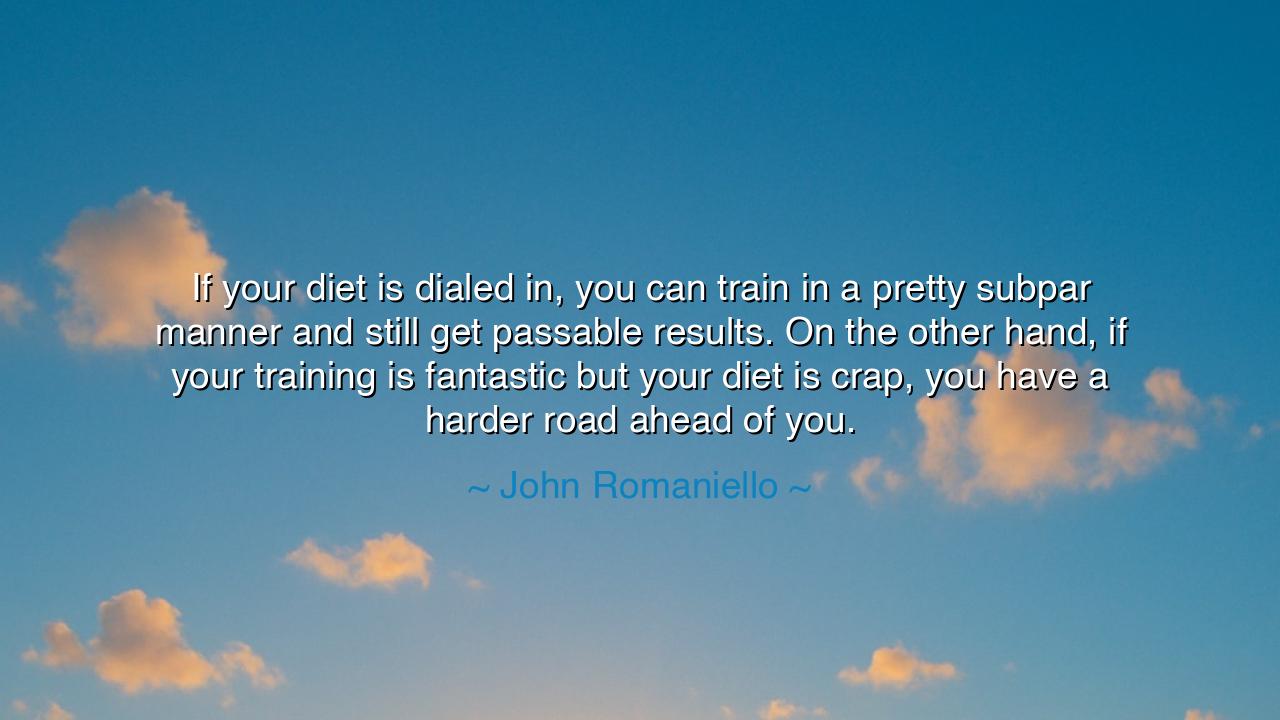
If your diet is dialed in, you can train in a pretty subpar
If your diet is dialed in, you can train in a pretty subpar manner and still get passable results. On the other hand, if your training is fantastic but your diet is crap, you have a harder road ahead of you.






In the words of John Romaniello, we find a truth that echoes across the disciplines of both body and spirit: “If your diet is dialed in, you can train in a pretty subpar manner and still get passable results. On the other hand, if your training is fantastic but your diet is crap, you have a harder road ahead of you.” Though spoken in the language of modern fitness, this wisdom reaches back through the ages, touching the same eternal principle known to philosophers, warriors, and sages alike—that foundation matters more than flourish, and that nourishment precedes achievement. Romaniello’s teaching, stripped of its contemporary phrasing, is the timeless reminder that no matter how great one’s effort, if the root is weak, the fruit will not flourish.
To say that one’s diet—the sustenance of the body—is more crucial than training is to recognize the hierarchy of creation itself. The ancients taught that all strength begins with nourishment, not just of flesh but of soul. A warrior may wield his sword with unmatched precision, but if his body is starved or poisoned, his power will falter. Likewise, a man may labor endlessly in the gym, pushing through the limits of endurance, yet if what he feeds himself is corrupted, his foundation crumbles from within. Romaniello’s words remind us that the body, like the mind, is a temple—and a temple cannot stand on a broken foundation, no matter how grand its outer columns appear.
The ancient Greeks, masters of both philosophy and physical excellence, understood this deeply. In the schools of Pythagoras and Hippocrates, diet was not a matter of vanity but of virtue. “Let food be thy medicine,” said Hippocrates, recognizing that the health of the body was sacred, a precondition for wisdom and courage alike. The Olympians of old did not train without care for what they ate; they knew that discipline in diet was discipline in thought, that to feed oneself wisely was to train the will as much as the body. Romaniello’s teaching stands firmly in this lineage—it is a rebirth of that ancient understanding that discipline in consumption is the mother of all strength.
Consider the parable of Milo of Croton, the legendary wrestler who carried a calf on his shoulders every day until it grew into a bull. His training was magnificent, yet it was his understanding of nourishment that made his body unbreakable. Milo fed himself with intention—balancing strength with sustenance, effort with rest. His example endures not merely as a story of physical triumph, but as a testament to balance. For effort without wisdom leads to exhaustion, just as training without proper fuel leads to ruin. Romaniello’s insight, spoken in the tongue of modern science, is the same law that guided Milo’s generation: mastery begins not with action, but with alignment—with the unseen disciplines that sustain the visible work.
In the contrast between “a subpar manner” of training and “a fantastic” one lies another truth—the paradox of human effort. Romaniello is not dismissing the value of hard work, but revealing that excellence cannot thrive in isolation. To train perfectly while feeding poorly is to swim against the current of nature. Yet even moderate effort, when harmonized with nourishment, yields results, for it moves with the flow of life’s rhythm. The Taoists of the East would call this the way of Wu Wei—effortless effort, born from harmony rather than struggle. In this way, diet becomes not only a physical choice, but a spiritual one: a daily act of alignment between what one desires and what one truly honors.
There is also humility in Romaniello’s teaching. It dismantles the illusion that effort alone is enough—that we can force results through willpower while neglecting the quiet, unseen disciplines of care. This truth stretches far beyond the gym. The same principle governs the craftsman, the scholar, the leader. A man may labor day and night on his art, yet if his foundation—his health, his focus, his moral diet—is poor, his brilliance will fade. The warrior who fights without rest, the thinker who studies without balance, the artist who creates without nourishment—all burn brightly for a time, but briefly. To sustain greatness, one must first sustain the self.
The lesson, then, is simple yet profound: tend to the root before you seek the fruit. A strong body begins not in motion, but in mindful nourishment. Before you train, learn to eat well; before you strive, learn to sustain. This is the wisdom of balance—the harmony between what you take in and what you give out. Let your diet, both literal and metaphorical, be one of intention: fill your body with what strengthens, your mind with what enlightens, and your spirit with what inspires. For only then can your training, your work, and your life bear the weight of your dreams.
Thus, as the ancients would say, excellence begins at the table—not in indulgence, but in awareness. The food you choose, like the thoughts you keep, becomes your destiny. Feed your body with wisdom, and your efforts will bear fruit beyond your imagining. Neglect the source, and even the greatest labor will fade into dust. Romaniello’s words remind us that success—whether of flesh, mind, or spirit—cannot be forced by strength alone. It must be nourished into being, with patience, care, and reverence for the sacred balance between effort and sustenance.






AAdministratorAdministrator
Welcome, honored guests. Please leave a comment, we will respond soon